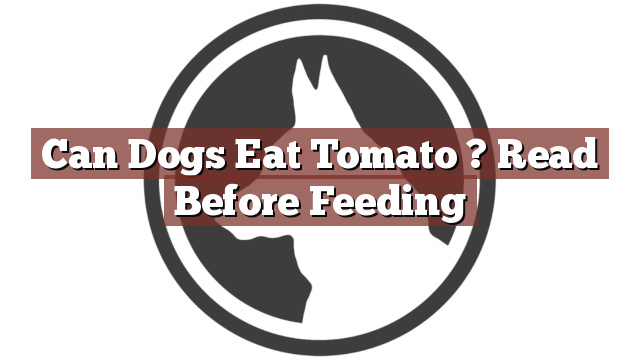Understanding Your Dog’s Dietary Needs
As a responsible pet owner, it is essential to understand the dietary needs of your dog. While dogs primarily thrive on a balanced diet of meat, grains, and vegetables, it is crucial to be aware of foods that may be harmful to them. Some human foods can be toxic to dogs and should be avoided to prevent any adverse health effects. One common question that arises is, can dogs eat tomatoes? Let’s explore this topic further to ensure the well-being of our furry friends.
Can Dogs Eat Tomato? Read Before Feeding
The answer to the question "can dogs eat tomatoes?" is yes, but with certain precautions. Tomatoes are a part of the nightshade family, which contains a substance called solanine. Solanine is toxic to dogs in large quantities and can cause symptoms like gastrointestinal upset, weakness, and even tremors. However, the solanine content in ripe tomatoes is relatively low, making them safe for dogs to consume in moderation.
Pros and Cons of Feeding Tomato to Your Dog
Feeding tomatoes to your dog can have several benefits. They are an excellent source of essential vitamins, including vitamin C, vitamin A, and potassium. These vitamins contribute to the overall health and well-being of your dog. Additionally, tomatoes are rich in antioxidants, which can help boost your dog’s immune system and combat the harmful effects of free radicals.
However, it is vital to consider the cons as well. Some dogs may be allergic to tomatoes, leading to allergic reactions such as itching, redness, or gastrointestinal distress. Furthermore, the seeds and skin of tomatoes can pose a choking hazard or cause digestive issues in dogs. To mitigate these risks, it is recommended to remove the seeds and skin before feeding tomatoes to your dog.
Conclusion: Considerations for Feeding Tomato to Your Dog
While dogs can eat tomatoes in moderation, it is crucial to consider certain factors before adding them to your dog’s diet. If you decide to feed tomatoes to your dog, make sure they are ripe and remove the seeds and skin to reduce the risk of choking or digestive problems. Start by introducing small amounts and monitor your dog for any adverse reactions. If your dog shows signs of discomfort or allergies, it is best to avoid feeding them tomatoes altogether. Always consult with your veterinarian to ensure your dog’s dietary needs are being met and to address any specific concerns related to their health.
By understanding your dog’s dietary needs and being cautious about the foods you introduce, you can ensure your pet’s well-being and promote a healthy and balanced diet. Remember, a happy and healthy dog is a joy to have around!
Thank you for taking the time to read through our exploration of [page_title]. As every dog lover knows, our furry friends have unique dietary needs and responses, often varying from one canine to another. This is why it's paramount to approach any changes in their diet with caution and knowledge.
Before introducing any new treats or making alterations to your dog's diet based on our insights, it's crucial to consult with a veterinarian about [page_title]. Their expertise ensures that the choices you make are well-suited to your particular pet's health and well-being.
Even seemingly harmless foods can sometimes lead to allergic reactions or digestive issues, which is why monitoring your dog after introducing any new food item is essential.
The content provided here on [page_title] is crafted with care, thorough research, and a genuine love for dogs. Nevertheless, it serves as a general guideline and should not be considered a substitute for professional veterinary advice.
Always prioritize the expert insights of your veterinarian, and remember that the health and happiness of your furry companion come first.
May your journey with your pet continue to be filled with joy, love, and safe culinary adventures. Happy reading, and even happier snacking for your canine friend!

